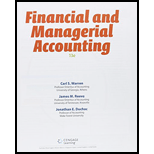
(a)
Accounts receivable turnover is a liquidity measure of accounts receivable in times, which is calculated by dividing the sales by the average amount of net accounts receivables. In other words, average receivable turnover ratio identifies the number of times the average amount of accounts receivables being collected during a particular period.
Days’ sales in receivables:
Days’ sales in receivables indicate the number of days taken by a business, to collect its outstanding amount of accounts receivable on an average. It is otherwise known as average collection period.
To calculate: Company R’s accounts receivable turnover ratio for 2016 and 2015.
(b)
To calculate: Company R’s days’ sales in receivables for 2016 and 2015.
(c)
To identify: Whether the change in accounts receivable turnover and the day’s sales in receivables from 2015 to 2016 are favorable or unfavorable.
Want to see the full answer?
Check out a sample textbook solution
Chapter 8 Solutions
Bundle: Financial & Managerial Accounting, Loose-Leaf Version, 13th + CengageNOWv2, 2 terms Printed Access Card
- Swifty Supply Co. has the following transactions related to notes receivable during the last 2 months of 2027. The company does not make entries to accrue interest except at December 31. Nov. 1 Loaned $30,000 cash to Manny Lopez on a 12 month, 10% note. Dec. 11 Sold goods to Ralph Kremer, Inc., receiving a $85,500, 90-day, 8% note. 16 Received a $87,840, 180 day. 10% note to settle an open account from Joe Fernetti. 31 Accrued interest revenue on all notes receivable. (a) Journalize the transactions for Swifty Supply Co. (Ignore entries for cost of goods sold.) (Credit account titles are automatically indented when amount is entered. Do not indent manually. Use 360 days for cal in the order presented in the problem. List all debit entries before credit entries.) Date Account Titles and Explanation Debit Creditarrow_forwardHi expert please give me answer general accounting questionarrow_forwardHoward James started a business in 2011 in Jamaica and has been operating in the wholesale/retail industries, where he buys and sells household items to the local market. In 2012, he expanded his business operations and opened two other businesses in Trinidad and Tobago and Antigua and Barbuda, respectively. The annual sales of the respective businesses in 2015 are: Jamaica: J$3,000.00 Trinidad and Tobago: TT$251,000.00 Antigua and Barbuda: $299.00 Mr. James failed to register his business for VAT/GCT as specified by the respective Sales Tax Acts and Regulations. He stated that there is no need for his businesses to be registered because their sales are under the VAT thresholds and thus not required to be registered. a) You are to advise Mr. James if his decision not to register his businesses is justifiable. b) Search the respective VAT Acts for the 3 countries and advise Mr. James of the benefits of being a registered taxpayer; also the penalties for not registering for VAT/GCT.arrow_forward
- FILL ALL CELLS. NOTICE THE DROPDOWN OPTIONSarrow_forwardABF's metal spare parts manufacturing company uses the customised production method by attributing the GST to the products it produces with the help of predetermined attribution coefficients. The processing of metal parts is carried out in two production departments: the Cutting and Drilling department, and the Assembly department. The GIS attribution coefficients for the two departments are based on the operating hours of machines and the cost of direct work respectively. At the beginning of the year, the following budgets were implemented: Cutting and Drilling Department Assembly Department Direct Labor Costs (in euros) 1.320.000 2.000.000 G.B.E. (in euros) 4.800.000 2.400.000 Machinery Operating Hours 80.000 5.000 Direct Work Hours 27.000 12.000 Requested: To calculate the coefficient of attribution of the General Secretariat that will be used in each department. (4 units) To determine the production cost per unit for order 158 which…arrow_forwardPLEASE HELP. I HAVE PROVIDED THE DROPDOWN OPTIONSarrow_forward
- The difference between the balance in a company's cash account and its bank statement is documented in the __________ of the bank statement.arrow_forwardLarge corporations should report revenues on their income statements when the __________. Cash Is Received Revenues Are Earnedarrow_forwardPLEASE HELP WITH THIS PROBLEMarrow_forward
 Managerial Accounting: The Cornerstone of Busines...AccountingISBN:9781337115773Author:Maryanne M. Mowen, Don R. Hansen, Dan L. HeitgerPublisher:Cengage LearningPrinciples of Accounting Volume 1AccountingISBN:9781947172685Author:OpenStaxPublisher:OpenStax College
Managerial Accounting: The Cornerstone of Busines...AccountingISBN:9781337115773Author:Maryanne M. Mowen, Don R. Hansen, Dan L. HeitgerPublisher:Cengage LearningPrinciples of Accounting Volume 1AccountingISBN:9781947172685Author:OpenStaxPublisher:OpenStax College Managerial AccountingAccountingISBN:9781337912020Author:Carl Warren, Ph.d. Cma William B. TaylerPublisher:South-Western College Pub
Managerial AccountingAccountingISBN:9781337912020Author:Carl Warren, Ph.d. Cma William B. TaylerPublisher:South-Western College Pub College Accounting, Chapters 1-27AccountingISBN:9781337794756Author:HEINTZ, James A.Publisher:Cengage Learning,
College Accounting, Chapters 1-27AccountingISBN:9781337794756Author:HEINTZ, James A.Publisher:Cengage Learning, College Accounting, Chapters 1-27 (New in Account...AccountingISBN:9781305666160Author:James A. Heintz, Robert W. ParryPublisher:Cengage Learning
College Accounting, Chapters 1-27 (New in Account...AccountingISBN:9781305666160Author:James A. Heintz, Robert W. ParryPublisher:Cengage Learning Survey of Accounting (Accounting I)AccountingISBN:9781305961883Author:Carl WarrenPublisher:Cengage Learning
Survey of Accounting (Accounting I)AccountingISBN:9781305961883Author:Carl WarrenPublisher:Cengage Learning





